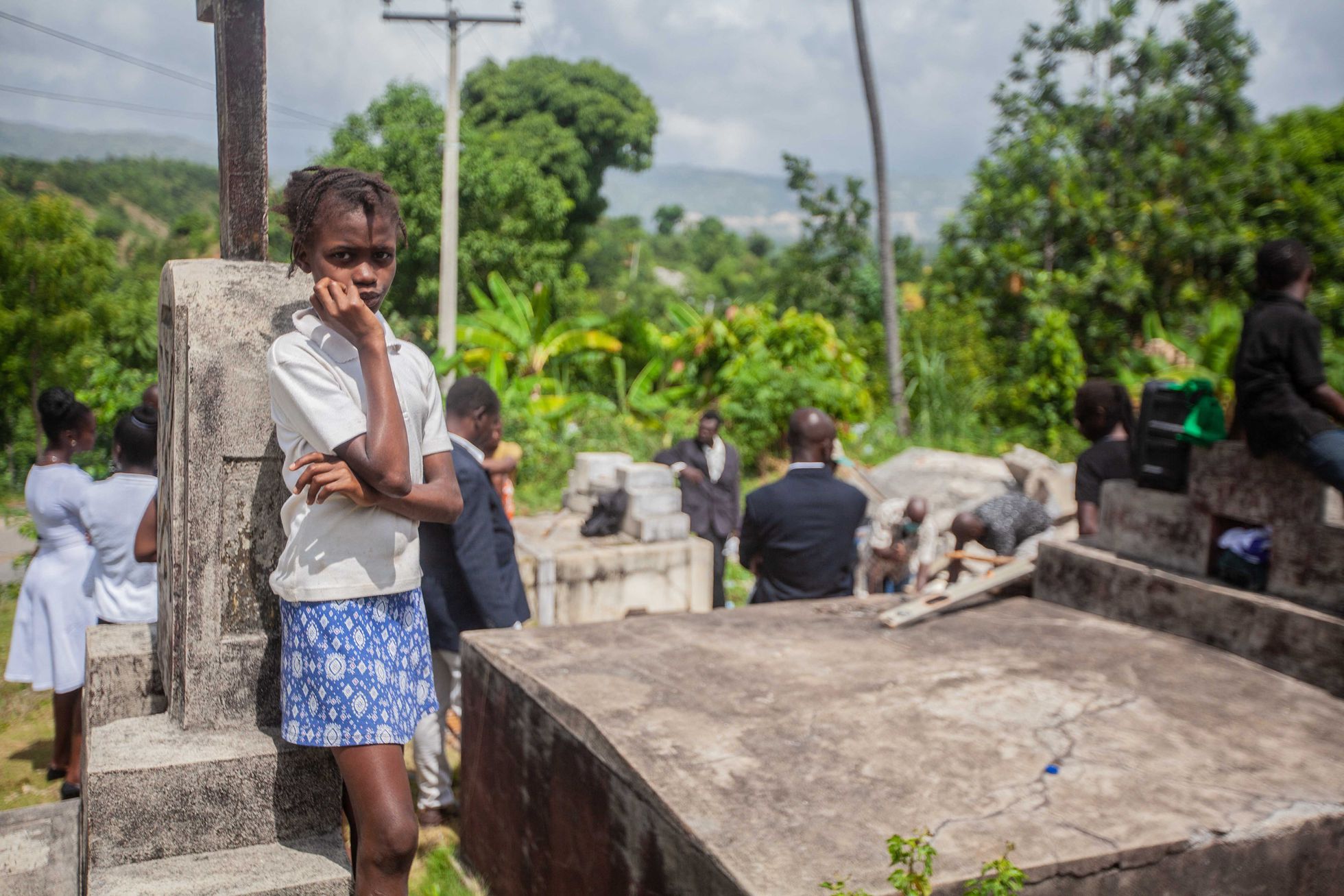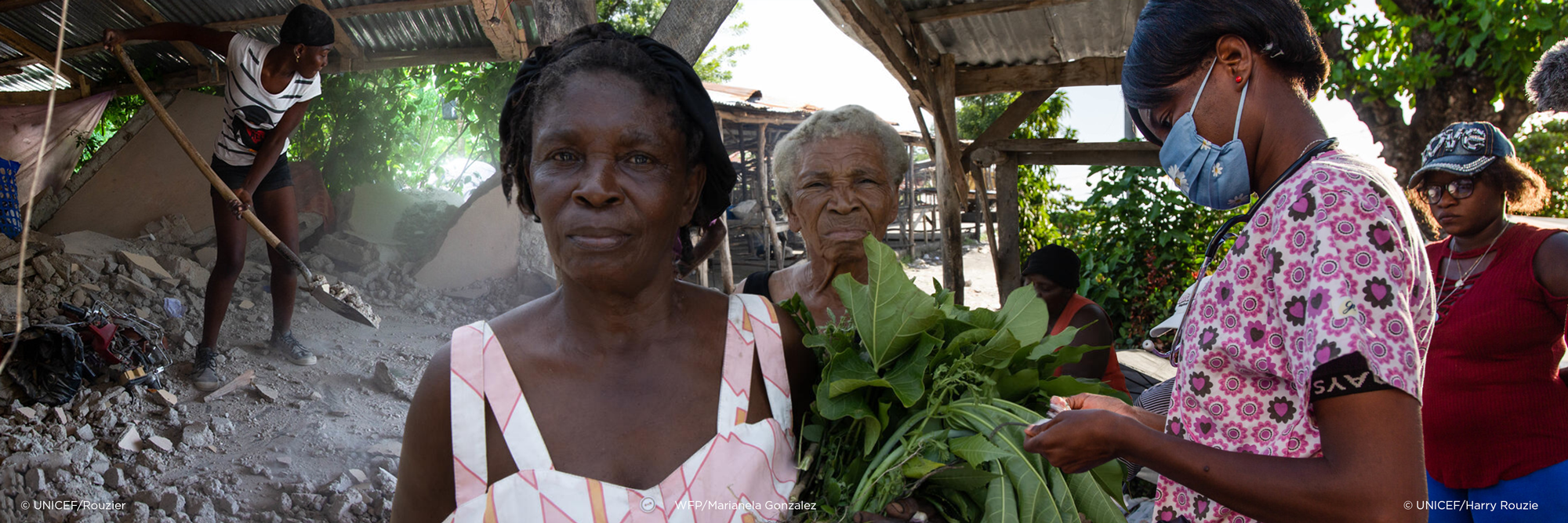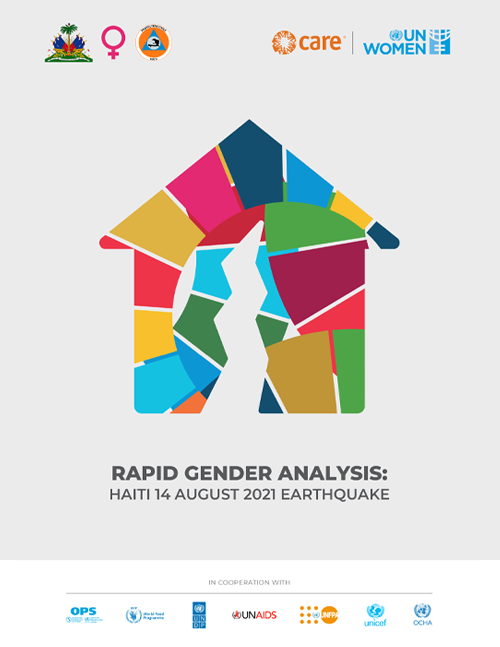Food insecurity is another issue raised in the report as one of the urgent needs to be addressed. Before the earthquake, 46% of the population had unmet food needs, among which the situation of children, adolescents, and pregnant women was of concern. The earthquake exacerbated pre-existing vulnerabilities. Respondents said they did not receive enough support. The most vulnerable, children, the elderly, the sick, and the disabled, seem to have difficulty accessing the food distributed.
According to the report, 53.6% of women and 46% of men have already experienced difficulties in accessing health services due to the current health crisis; lack of housing and shelter is perceived by 83% of respondents as a factor of insecurity and increased risk of violence; 79% of the population perceives that women are highly involved in the response process, but 22% note that their presence in decision-making is weaker.
This corresponds to women's participation at the national level. Women's representation in parliament is one of the lowest in the world. In previous parliaments, women were represented by less than three percent of parliamentarians. Women continue to be underrepresented in elected and public office. Currently, women represent only 27.7 percent of ministers and 2.7 percent of the National Assembly (50th Parliament). There are 0% women in the CSPJ (Superior Council of the Judiciary) and about 10-12% women in the judiciary. One of the factors explaining this low presence is electoral violence against women (EVAW).

Photo: Richard Pierrin/ AFP
A devastating outlook
OCHA estimates that at least 1 to 5 million people are directly affected by the violence in the Port-au-Prince metropolitan area due to a lack of access to health and education services and deteriorating hygiene, sanitation, and access to clean water.
Haiti's number of people in need of humanitarian assistance has nearly doubled in the last 4 years, from 2.6 million in 2019 to 4.9 million in 2022.
Hundreds of mothers and unaccompanied children, including girls, had to flee their homes because of the latest clash between armed groups in the commune of Cité Soleil in early July 2022. These families and children, who have lost their husbands and fathers and/or mothers, are forced to take refuge in the commune of Delmas in public squares and schools that should reopen in a month.
"Armed violence has reached unimaginable and intolerable levels in Haiti," said Michelle Bachelet, the UN High Commissioner for Human Rights. Urgent action must be taken to restore the rule of law, protect the population from armed violence and hold the political and economic sponsors of these gangs accountable.
Despite the challenging context, UN Women Haiti continues to support Haitian women. For example, the population of the Abricots commune is being sensitized and made aware of the law on violence against women. Thousands of health kits have also been distributed in the regions affected by the earthquake. More than 20,000 people, 10,400 women and 9,600 men were sensitized to gender and gender-based violence in the four communes covered by the project: Cap-Haitien, Pignon, Ranquitte, La Victoire. On June 25, UN Women launched two new projects aimed at strengthening the capacities of women's rights organizations.
Other measures taken by UN Women in the aftermath of the devastating earthquake that hit Grand'Anse and the South include:
- More than 150 members of women's organizations have been trained on marketing strategies through adapted packaging. More than 800 women from the organizations have benefited from a set of valuable agricultural materials and equipment to strengthen their production.
- More than 100 women from associations and groups have the tools and knowledge to negotiate their products on the market and can recover their production to meet other needs.
- 26 organizations have been strengthened in organizational management and in the management of solidarity mutuals.
- 10 organizations (solidarity mutuals) received working capital to strengthen their local activities of repaired beneficiary organizations (electricity maintenance, renovation of spaces, repair of agricultural equipment).
- Acquisition of agricultural equipment for 12 organizations.
- Purchase of raw materials for two women's organizations engaged in product processing.
Shortly after this catastrophe, UN Women Haiti, through its civil society partners, had to carry out various activities to help the earthquake victims. And the category of beneficiaries is divided into five main groups:
- Raped women and girls
- Vulnerable women
- Elderly people and religious leaders
- Young people (youth movements, school children, scouts, etc.)
-
Men (training in positive masculinity)
The different activities that UN Women Haiti could carry out to support women and girls in this region affected by the earthquake of August 14 are as follows
- Social, financial, logistical, and technical support to grassroots community organizations and vulnerable women, including women with disabilities.
- Shelter for women and girls victims of violence;
- Support (medical, psycho-social, and legal) to women and girls victims of violence;
- Training in positive masculinity for religious leaders;
- Training in positive masculinity for Men in Action and protection against sexual exploitation and abuse; in positive masculinity for youth movements;
- Financial support after the earthquake;
-
Sensitization against gender-based violence for school children (Scouts, Red Cross, brigade);
Despite all these efforts, much remains to be done. Haitian women and girls are the most vulnerable in this scenario of entrenched violence. They are often abducted, confined, and gang raped by armed groups. They need strong support to help them cope with the situation worsening by the day. UN Women reaffirms its call not to lose sight of Haiti.
UN Women, as a UN entity working for women's rights, calls for help to reach women and girls in the south who are victims of the earthquake, the political and socio-economic crisis, and those directly affected by gang violence in the country.

